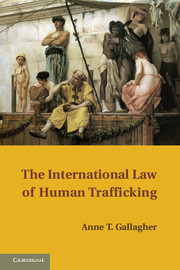Book contents
- Frontmatter
- Contents
- Preface
- Table of Cases
- Table of Treaties and Other International Instruments
- Table of Common Abbreviations
- THE INTERNATIONAL LAW OF HUMAN TRAFFICKING
- Introduction
- 1 The International Legal Definition
- 2 The International Legal Framework
- 3 Specific Legal Issues
- 4 State Responsibility for Trafficking
- 5 Obligations of Protection and Support
- 6 Obligations Related to Repatriation and Remedies
- 7 Obligations of an Effective Criminal Justice Response
- 8 Obligations to Prevent Trafficking and Respond Lawfully
- 9 Issues of Compliance, Implementation, and Effectiveness
- Epilogue
- Select Bibliography
- Index
- References
2 - The International Legal Framework
Published online by Cambridge University Press: 10 January 2011
- Frontmatter
- Contents
- Preface
- Table of Cases
- Table of Treaties and Other International Instruments
- Table of Common Abbreviations
- THE INTERNATIONAL LAW OF HUMAN TRAFFICKING
- Introduction
- 1 The International Legal Definition
- 2 The International Legal Framework
- 3 Specific Legal Issues
- 4 State Responsibility for Trafficking
- 5 Obligations of Protection and Support
- 6 Obligations Related to Repatriation and Remedies
- 7 Obligations of an Effective Criminal Justice Response
- 8 Obligations to Prevent Trafficking and Respond Lawfully
- 9 Issues of Compliance, Implementation, and Effectiveness
- Epilogue
- Select Bibliography
- Index
- References
Summary
Modern, positivist approaches to international law accept the central place of consent in both the formation and continuing acceptance of international legal rules. In other words, States are bound by international laws because they choose to be. Consent to be bound is most clearly and unambiguously adduced from the purposeful decision of a State to enter into a treaty. However, other “traditional” sources of law, custom and general principles, are similarly dependent on the State making some kind of tangible commitment that serves to express its will. While non-State actors play an important role in shaping international law, the task of identifying the source and nature of specific legal obligations is best served by a conservative position that accepts that international law is made, or recognized or accepted through the will of States, and that “nothing becomes law for the international system from any other source.”
This chapter confines itself to a survey and analysis of international legal rules that generally pass this test. Its primary focus is the web of international treaties that have developed over the past century to address trafficking and related forms of exploitation and whose coverage of the topic is, today, remarkably comprehensive. The chapter also provides a brief analysis of customary law as it relates to trafficking and of secondary and subsidiary sources of international law, including general principles and judicial decisions.
- Type
- Chapter
- Information
- The International Law of Human Trafficking , pp. 54 - 143Publisher: Cambridge University PressPrint publication year: 2010



